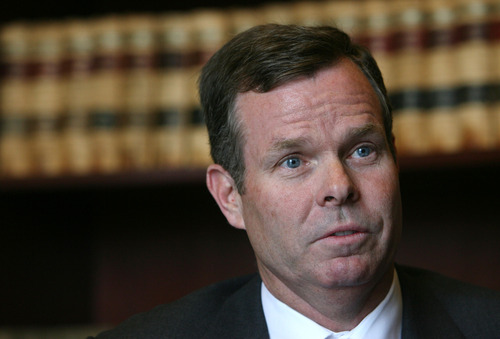This is an archived article that was published on sltrib.com in 2013, and information in the article may be outdated. It is provided only for personal research purposes and may not be reprinted.
House Speaker Becky Lockhart said Monday that public trust has eroded so much in embattled Attorney General John Swallow that if a formal impeachment investigation is not now needed, it soon will be.
"We're rapidly coming to the point, if we haven't already, where the House of Representatives needs more information, and we cannot rely on the federal investigations" or other local probes to resolve allegations quickly to restore trust , she said. "We just don't know when they will be done."
Lockhart made those comments in an online Trib Talk before House Republicans are scheduled to spend three hours Wednesday discussing the impeachment process and whether to impeach Swallow.
Swallow faces federal, state and county probes into numerous allegations, including that he helped broker deals to assist a businessman suspected of cheating customers and that he promised protection to potential donors to his predecessor, Mark Shurtleff. Swallow also faces at least two ethics complaints filed with the Utah State Bar.
"Every couple of weeks, or every couple of days, frankly, it seems like there are new things that are alleged," Lockhart said.
House GOP members, she added, will not focus so much Wednesday on whether Swallow committed actual crimes, but whether he has lost public trust and is damaging the ability of his office to function.
Rep. Spencer Cox, R-Fairview, an attorney, said on the Trib Talk that while the Utah Constitution allows impeachment for "high crimes and misdemeanors" and malfeasance in office, that wording was borrowed from old English law — and does not mean actual crimes must have been committed, but only that public trust is lost. Cox said that while Swallow's attorneys have argued that for him to be impeached he must have committed a crime while in office, that is "blatantly wrong."
"There's an old axiom in the law," Cox said, "that if the facts are on your side, you argue the facts; if the law is on your side, you argue the law; and if neither the facts nor the law is on your side, you just argue like hell. There was a little bit of that going on."
Lockhart agreed that impeachment isn't restricted to criminal activity.
"This isn't necessarily an issue of criminality. This is an issue of public trust. We're rapidly, rapidly — if we haven't already gotten to the point — where we have to have more information" to restore that trust, so an impeachment investigation may be needed.
"If we believe that the public trust has been broken through the evidence that we gather," she said, " … then we have a duty to restore the public trust."
Cox said if he had to vote today, he would vote to begin the impeachment process. He said he was at the recent Juab County GOP convention and asked delegates if they believed Swallow has violated the public trust. "Almost every hand in the room went up," he said. "I think that is very telling."
Rep. Rebecca Chavez-Houck, D-Salt Lake City, said Democrats believe starting a formal impeachment investigation also is important to have a publicly transparent process as opposed to private meetings that Swallow has offered to have with lawmakers to give his side of the story.
Cox agreed. "If we're working to restore the public trust, and there's some sort of communication happening that's not in the public sphere, then it could be perceived by the public that the process is not open."
Lockhart said no final decision on whether to impeach Swallow likely will be made Wednesday, although "I think we'll have a very good idea of where the Republican caucus is by about 2:30 or 3 p.m. on Wednesday. We already know where the Democratic caucus is."
House Democrats have called for a thorough investigation of the attorney general, either through a special committee or, if necessary, via impeachment.
If Lockhart believes enough members want to begin impeachment, she will send a formal written poll to them. If two-thirds want it, she may convene an impeachment session. If a two-thirds majority approves a resolution there, the House may begin its own formal investigation — and would choose whether to appoint a special committee or hire a special prosecutor.
That committee could send articles of impeachment to the full House. If any counts are approved by a two-thirds majority, the Senate would then hold a trial — and Swallow would be temporarily suspended from office until Senate action ends. A two-thirds majority there could remove Swallow from office, and it also could choose to also permanently bar him from holding any elected office.



